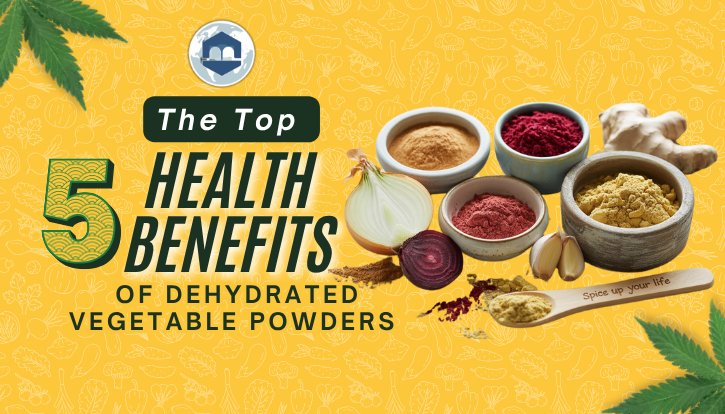


Okay, quick question:
When was the last time you really got enough veggies in your day?
Don’t rush to answer. Think honestly. Was it yesterday’s drive-thru salad (which, let’s face it, was 90% iceberg)? Or that soggy half-carrot you meant to steam but forgot in the fridge… three days ago?
Yeah. We’ve all been there.
Here’s the thing—your body isn’t skipping out on nutrients… you are. Not intentionally, of course. Life happens. Schedules stretch thin. Fresh produce goes bad. You eat what’s available, not always what’s ideal.
And that’s exactly why dehydrated vegetable powder is quietly becoming a secret weapon for real people with real lives in the U.S.—not wellness gurus or kale-loving influencers. Regular folks. Parents. Students. Gym rats. Entrepreneurs.
Let’s break it down.
It sounds a little weird at first—vegetables in powder form? Like what, astronaut food?
But here’s the truth: it’s not space-age. It’s smart.
Carrots, tomatoes, onions, garlic—nutrient-dense veggies we all know and love—are gently dried, finely milled, and packed in their powdered form. No chemicals. No weird lab stuff. Just food, preserved.
This means you get vegetable powder nutrition in its purest, most shelf-stable form. And it’s surprisingly flavorful. Sweet, earthy, savory. Think: cooking without the chopping board drama.
According to the CDC, only 1 in 10 adults in the U.S. eats enough vegetables daily. That means a whopping 90% are not even meeting the baseline for veggie intake.
Pair that with USDA reports stating that up to 30% of purchased fresh vegetables go to waste, and you’ve got a recipe for nutritional gaps and financial loss.
Dehydrated vegetable powders? They flip that equation.
A spoonful of dried vegetable powder for health in your morning smoothie or soup is now the fastest way to bridge your nutrition gap—without reaching for a multivitamin that your body might barely absorb.
Here's where the real punch lands.
Let’s break down a few key health benefits of vegetable powders you might not expect:
And yes—dehydrated vegetables health benefits go beyond just vitamins. These powders retain fiber, natural plant compounds, and essential micronutrients—thanks to methods that prioritize preserving nutrients in vegetable powders.
They’re real food. Just more reliable.
Let’s clear something up: this isn’t about popping pills or swallowing something you can't pronounce.
Vegetable supplements in powdered form aren’t trying to replace meals—they’re here to upgrade them.
Toss a teaspoon of powdered vegetables for smoothies, blend it with almond milk and banana, and boom—you’ve got a nutrition-packed start to your day without the spinach-stained cutting board.
Or add a pinch of garlic and tomato powder to a weeknight pasta sauce—hello flavor, goodbye bland. It’s dehydrated food nutrition blended seamlessly into your lifestyle.
No effort. No guilt.
So… What’s Actually In This Stuff? (A Closer Look)
Let’s take a few pantry MVPs:
Rich in vitamin A, it supports eye health, skin repair, and immune response.
Fun fact: One tablespoon equals roughly one whole carrot.
Packed with lycopene, known to reduce oxidative stress and support heart function.
The allicin content is intact in quality powders—helps fight inflammation, supports cholesterol balance.
A natural prebiotic that supports gut health and helps control blood sugar.
This is not “just” powder. It’s a precision-crafted pantry hero with vegetable powder benefits your multivitamin can’t even mimic.
Don’t think this is a niche trend.
Market analysts at Grand View Research predict that the global dried vegetable market will hit $110 billion by 2028, with North America as one of the fastest-growing regions.
Major wellness brands, organic grocers, and even smoothie bars across Los Angeles, Austin, and New York are already integrating dehydrated vegetable powder into their products—because Americans are waking up to one truth: real nutrition must fit real schedules.
And frankly, the U.S. consumer is done with fake food.
I’ll admit—I didn’t get it at first either.
But then I started working with clients who had the best intentions and the worst schedules. Nurses on night shifts. Moms juggling two jobs. Seniors who couldn’t cook much anymore.
When we added vegetable powders to their routine—just small amounts daily—things changed.
No more throwing out unused kale (thank God).
One client told me, “I finally feel like I’m feeding my body, not just filling it.”
That hit hard.
So yeah, maybe this article felt a bit messy, a bit all over the place. But so is life.
The truth? You don’t need a chef, a dietitian, or a six-month meal prep plan.
You need something that works.
Dehydrated vegetable powders aren’t here to make you feel guilty about what you didn’t eat yesterday. They’re here to make tomorrow’s nutrition easier, smarter, and more real.
Your health deserves better than a backup plan. So give it a baseline.
Start with dehydrated vegetable powder that doesn’t ask for anything back—no time, no prep, no stress. Just nutrients. Straightforward and strong.
And when it comes to sourcing pure, quality-assured, nutrient-rich powders that don’t mess around with fillers or false promises, Bulk In Global is becoming a quiet revolution in American pantries. With a commitment to premium dehydrated vegetable powder, they’re bridging the gap between convenience and true wellness.
Whether you’re blending up a morning smoothie, powering through a meal-prep Sunday, or just looking for a smarter way to fuel your family, Bulk In Global ensures you never compromise on vegetable powder benefits.
Because in today’s world, eating well shouldn’t feel hard—and with Bulk In Global, it doesn’t.